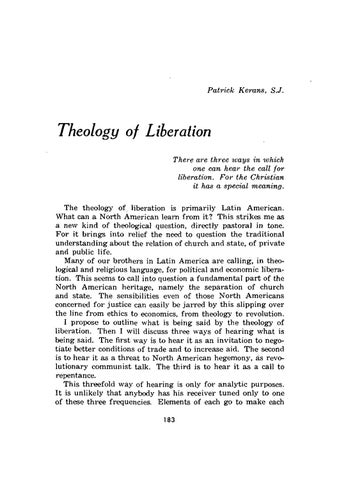Patrick Kerans, S.J.
Theology of Liberation There a1路e three ways in which one can hea;r the call for libe路ration. For the Christian it has a special meaning. The theology of liberation is primarily Latin American. What can a North American learn from it? This strikes me as a new kind of theological question, directly pastoral in tone. For it brings into relief the need to question the traditional understanding about the relation of church and state, of private and public life. Many of our brothers in Latin America are calling, in theological and religious language, for political and economic liberation. This seems to call into question a fundamental part of the North American heritage, namely the separation of church and state. The sensibilities even of those North Americans concemed for justice can easily be jarred by this slipping over the line from ethics to economics, from theology to revolution. I propose to outline what is being said by the theology of liberation. Then I will discuss tht路ee ways of hearing what is being said. The first way is to hear it as an invitation to negotiate better conditions of tt路ade and to increase aid. The second is to hear it as a threat to North American hegemony, as revolutionary communist talk. The third is to hear it as a call to repentance. This threefold way of hearing is only for analytic purposes. It is unlikely that anybody has his receiver tuned only to one of these three frequencies. Elements of each go to make each 183
